K1140
Kifunensine
solid,film or powder, ≥98%
Synonym(s):
FR 900494, Hexahydro-6R,7S,8aS-trihydroxy-5R-(hydroxymethyl)-imidazo[1,2-a] pyridine-2,3-dione
About This Item
Recommended Products
product name
Kifunensine, mannosidase inhibitor
biological source
synthetic (organic)
Quality Level
Assay
≥98%
form
film or powder
solid
solubility
water, double-distilled: 50 mM
storage temp.
−20°C
InChI
1S/C8H12N2O6/c11-1-2-3(12)4(13)5(14)6-9-7(15)8(16)10(2)6/h2-6,11-14H,1H2,(H,9,15)/t2-,3-,4+,5+,6+/m1/s1
InChI key
OIURYJWYVIAOCW-PQMKYFCFSA-N
Gene Information
human ... MAN1A1(4121) , MAN1A2(10905) , MAN1B1(11253) , MAN1C1(57134)
mouse ... MAN1A1(17155) , MAN1A2(17156) , MAN1B1(227619) , MAN1C1(230815)
rat ... MAN1A1(294410) , MAN1A2(295319) , MAN1B1(499751) , MAN1C1(362625)
General description
Application
Biochem/physiol Actions
Signal Word
Warning
Hazard Statements
Precautionary Statements
Hazard Classifications
Eye Irrit. 2
Storage Class Code
11 - Combustible Solids
WGK
WGK 3
Flash Point(F)
Not applicable
Flash Point(C)
Not applicable
Personal Protective Equipment
Certificates of Analysis (COA)
Search for Certificates of Analysis (COA) by entering the products Lot/Batch Number. Lot and Batch Numbers can be found on a product’s label following the words ‘Lot’ or ‘Batch’.
Already Own This Product?
Find documentation for the products that you have recently purchased in the Document Library.
Customers Also Viewed
Our team of scientists has experience in all areas of research including Life Science, Material Science, Chemical Synthesis, Chromatography, Analytical and many others.
Contact Technical Service















